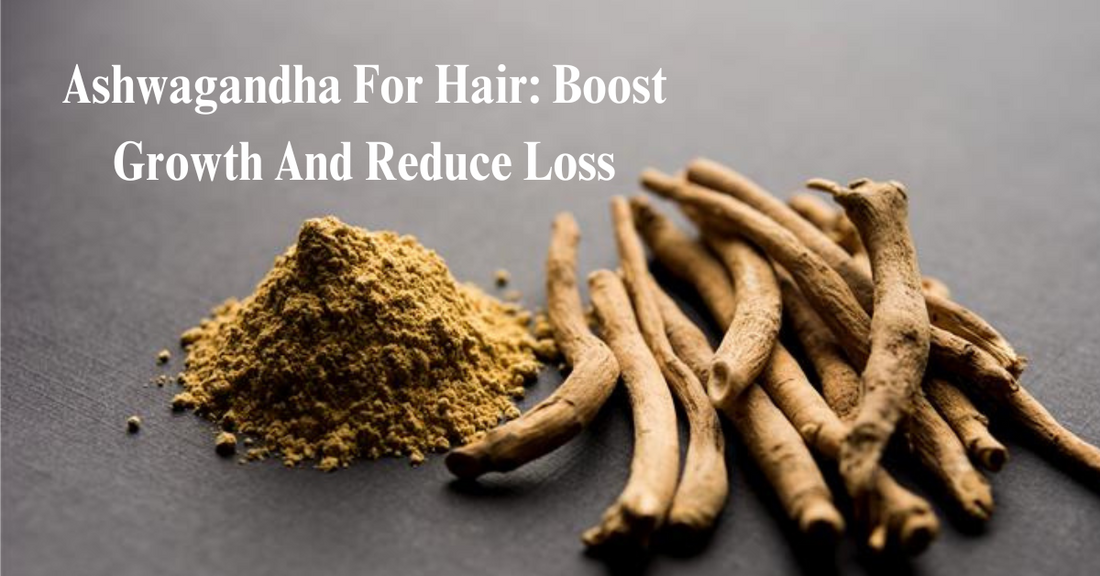
Ashwagandha For Hair: Boost Growth And Reduce Loss
Share
Hair loss is a common issue affecting both men and women, often due to stress, hormonal changes, poor diet, or genetic factors. Natural remedies like ashwagandha, a powerful herb used in traditional Ayurvedic medicine, are gaining popularity for their potential benefits for hair health. Ashwagandha, a root used in Ayurvedic medicine, has been used to treat mental and physical health concerns, including stress, which can be a common cause of hair loss.
Taking Ashwagandha to reduce stress levels may prevent or stop hair shedding. However, the connection between Ashwagandha and hair loss is still being studied. Hair loss can be caused by genetics, recent illness, and other factors and can be treated with medications, lifestyle changes, or procedures depending on the underlying cause.
Ashwagandha, an adaptogenic herb, is primarily used to support healthy sleep and mood, which may help with hair loss. Despite its long history, the connection between ashwagandha and hair loss is still being studied. Learn more about the potential role of ashwagandha for hair loss treatment, including possible benefits and what current scientific research says about this remedy.
Table of Contents
Ashwagandha Benefits for Hair
As we all know, cortisol damages hair follicles and inhibits healthy hair development. Ashwagandha helps to decrease follicular damage and blood cortisol levels. Furthermore, the herb reduces hair loss, which helps to increase hair density on the scalp by lowering tension and anxiety. The majority of Ashwagandha's benefits are due, at least in part, to its strong antioxidant and anti-inflammatory properties. Ashwagandha can increase antioxidant enzyme levels like glutathione peroxidase and superoxide dismutase while inhibiting lipid peroxidation. Ashwagandha appears to modify the hypothalamic-pituitary-adrenal axis, which plays an important role in stress response, as evidenced by its ability to reduce cortisol levels and alleviate stress and anxiety. Here are some benefits of ashwagandha for hair:
Can prevent hair loss:
Taking ashwagandha can help reduce hair loss and shedding caused by stress. By increasing the body's production of DHEA, a hormone that combats free radicals, ashwagandha helps prevent postpartum hair loss brought on by hormonal imbalances. This reduces oxidative damage and promotes thicker, healthier hair. Ashwagandha contains essential proteins for hair construction, elasticity, and strength, as well as potassium, nitrate, iron, tannins, glucose, vitamin C, antioxidant properties, and other compounds. It also promotes the delivery of these components.
Strengthens hair:
Ashwagandha can contribute to healthy hair as it contains antioxidants and amino acids that help to strengthen the hair and minimize breakage. Ashwagandha increases DHEA synthesis (Dehydroepiandrosterone), a naturally occurring hormone in your body that acts as an antioxidant. As a result, Ashwagandha aids in the elimination of free radicals from your scalp and hair follicles, supporting healthy hair growth.
Alleviates scalp irritation:
Ashwagandha, known for its anti-inflammatory properties, can improve skin appearance and alleviate symptoms of skin conditions like dandruff, psoriasis, and scalp itch. It soothes the scalp, reducing dandruff and itch, which contribute to hair loss. Ashwagandha calms the scalp, creating an environment that encourages hair growth, and it is particularly beneficial for those suffering from eczema, dandruff, psoriasis, and allergy-mediated scalp irritation.
Enhances your scalp and hair nourishment:
Ashwagandha contains protein, iron, vitamin C, tyrosine, and potassium—all of which are necessary for the normal growth of hair. Ashwagandha also assists in the delivery of nutrients to hair follicles through the dilation of blood vessels, which improves blood circulation.
Reverses premature greying of hair:
Ashwagandha, which contains the amino acid tyrosine, helps to maintain consistent pigment levels, the pigment responsible for hair colour, and prevents premature greying. A decrease in melanin can contribute to a variety of skin disorders and premature greying of the hair. Ashwagandha includes tyrosine, an amino corrosive amino acid that acts as a precursor for melanin formation in the skin and follicles, hence helping to reduce premature hair greying.
Is Ashwagandha good for hair?

Ashwagandha can improve hair health in several ways. One of the primary advantages is its capacity to increase hair growth and thickness. Ashwagandha is thought to increase keratin production, a protein for healthy hair development. It may also stimulate blood flow to the scalp, nourishing the hair follicles and promoting healthy growth.
Ashwagandha may also help with hair loss or balding. This plant is said to have anti-inflammatory and antioxidant qualities that can reduce scalp inflammation and prevent future hair loss. Some research suggests that Ashwagandha may help enhance hair density and thickness in patients suffering from alopecia, a hair loss disorder.
In addition to promoting hair growth, Ashwagandha may also be beneficial for reducing inflammation and dandruff. Its anti-inflammatory properties can help to soothe the scalp and reduce dandruff, while its ability to nourish the hair can help to improve overall hair health.
Ashwagandha for Hair Loss
Research by NYU Langone Health shows that 80% of men and almost half of women experience significant hair loss. However, both men and women are working towards reducing hair loss and boosting hair growth. Ayurveda, a system of medicine, believes that every human body's physiology is influenced by the three doshas: Vata, Pitta, and Kapha. A change in these doshas can lead to various dosha-specific diseases, including scalp and hair issues. Maintaining the equilibrium of these doshas is essential for maintaining a healthy body, mind, and soul. Ashwagandha, a potent Ayurvedic medicine, is said to balance these doshas and help prevent hair loss.
While it does not directly treat hair loss or help hair grow back, it helps prevent instances that cause hair loss. Stress can contribute to hair shedding and hair loss, and ashwagandha can interfere with certain medications and conditions. Before starting an Ashwagandha supplement, consult a medical professional, especially if you take medications or have a medical condition.
Can Ashwagandha cause hair loss?

There's a lot of conversation about the benefits of ashwagandha, particularly for healthy hair development. However, many people report hair loss after taking Ashwagandha. The explanation for this is that this non-medicinal herb raises testosterone levels. This subsequently transforms into DHT, which can result in hair loss in persons who are genetically prone to pattern baldness.
As a result, Ashwagandha for hair loss therapy is not ideal for everyone. And if someone with androgenetic alopecia uses it to cure hair loss, they may lose even more hair. However, this might lead to the development of thick facial hair, which can be problematic for women.
Frequently Asked Questions
How to use Ashwagandha for hair growth?
Take ashwagandha powder, mix it with some powder to prepare a paste, and apply it straight to the scalp. Keep it on your hair for approx. 30-40 minutes for best results; rinse off the hair and enjoy a soothed and clean scalp!
Does Ashwagandha cause hair loss?
While Ashwagandha provides many benefits for healthy hair development, some people report losing hair after starting an Ashwagandha hair loss treatment. This occurs because this non-medicinal plant elevates testosterone levels, which then convert to DHT, which can cause hair loss in people who are predisposed to pattern baldness genetically.
Does ashwagandha increase hair growth?
Ashwagandha is referred to as the 'Queen of Herbs' in Ayurveda due to its multiple hair benefits. Include the miracle herb in your everyday hair care routine for the finest results. It also promotes hair growth and helps protect follicles, scalp, and hair tissue from harm.
